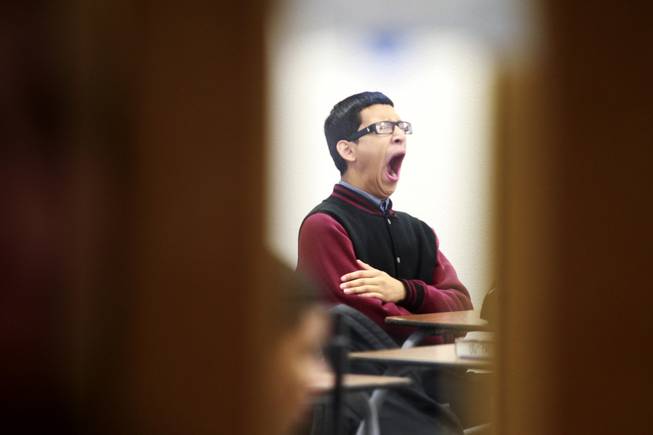
Jose Castaneda yawns during his first period class at Mojave Hight School Thursday, April 3, 2014.
Sunday, April 13, 2014 | 2 a.m.
Nicole Jewell scans her classroom as the first bell rings. Several seats in her first-period English class are still empty.
“I don’t know where everyone’s at this morning,” the Cheyenne High School teacher mutters as she double-checks the time.
It’s 6:50 a.m. The sun rose only 30 minutes ago.
Coping with the early bell
The Sunday spoke with UNLV psychology professor Christopher Kearney about how parents can help their children cope with early school start times. Here’s his advice.
1. Set regular and early bedtimes. Adolescents require eight to nine hours of sleep per night, about an hour more than adults. That means high schoolers should go to bed around 8 p.m. to catch the bus by 7 a.m.
2. Limit the number of extracurricular activities, especially those that run late. Kids need at least an hour to transition to sleep. Students who come back from a late theater performance or sports game will be too hyped to sleep. Limiting stressors will help teenagers sleep, too.
3. Limit screen-time right before bed. Research shows that bright cellphone and computer screens can impede sleep. Also, turn off or set your phone to “sleep mode” to keep those pesky midnight texts at bay.
4. Limit caffeine and sugar before bedtime. They can keep students up. Avoid energy drinks completely; they are not recommended for teens.
5. Do homework before dinner. Most students do their homework after dinner, when they are more tired. Students who start their work before dinner finish faster and earlier, and can have more time for family and sleep.
6. Make getting good sleep a priority. There’s no substitute for good sleep, and no healthy remedy to staying alert if you don’t get enough sleep. The worse the sleep, the worse the health and academic outcomes.
7. Make getting regular sleep a priority. You can’t “make up” sleep. After several nights of sub-par sleep, many students lose almost a full night of sleep by the end of the week.
8. It’s better to miss part of the day than to skip the entire day. Despite setting multiple alarms and parental nudging, students may oversleep and decide it’s not worth it to go to school. Even missing a handful of days has a strong negative impact on school performance.
As the teacher begins a discussion of “Beowulf,” a student yawns in the back of the classroom. Jewell admits it’s difficult to get teenagers chatting this early in the morning.
Minutes tick by. Several tardy students start streaming in. The last one enters at 7:11 a.m., about a third of the way through class.
“If they’re going to be late, they’re going to be late,” Jewell says later with a shrug. She’s not worried about these honors students, though. Most are on track to graduate.
These seniors just have to pass a handful of classes, including Jewell’s. As a result, they have half-day schedules and leave at lunchtime — which starts at 10:18 a.m.
“McDonald’s is still serving breakfast,” Jewell says, laughing.
• • •
With the first bell ringing at 6:50 a.m., Cheyenne High School has the earliest start time in the Clark County School District — and possibly in the country.
“It’s the earliest I’ve heard,” said Terra Ziporyn Snider, the executive director for the nonprofit advocacy group Start School Later. “You definitely win the prize.”
At Cheyenne, school starts so early that many of its 2,200 students wake up as early as 5 a.m. to walk, drive and ride the bus to the North Las Vegas campus. Many arrive tired and hungry, from missing sleep and skipping breakfast.
Earlier this school year, U.S. Education Secretary Arne Duncan argued that high schools like Cheyenne start too early for teenagers, whose biological clock ticks to a different schedule than adults. Amid growing research on the importance of sleep, educators and sleep activists are rekindling a decades-long movement to start school later and let teenagers sleep in.
“Families are really hurting now,” Snider said. “It’s insane living with severely sleep-deprived teenagers.”
• • •
Most American high schools today begin around 7:15 a.m. However, that wasn’t always the case.
A hundred years ago, most public schools started around 9 a.m. — when businesses opened. However, beginning in the 1970s, cash-strapped school districts across the country realized they could save millions of dollars in transportation costs by starting schools at staggered times.
By setting different start times for elementary, middle and high schools, school districts figured out that buses could run three different routes, saving money on drivers and vehicles.
Clark County made the switch to a three-tiered bell schedule by the early 1990s. To avoid having young children walking to school in the early dawn hours, the School District had high school students start the earliest.
Today, more than three-quarters of Las Vegas public high schools begin class before 7:30 a.m. Most begin at 7 a.m.
“What was once kind of absurd became the norm,” Snider said.
• • •
In the mid-1990s, researchers began learning more about the sleep patterns of teenagers. They found that adolescents are biologically hard-wired to stay up late and require more sleep.
Adolescents need eight to nine hours of sleep — an hour more than adults. And because of certain sleep hormones, teenagers don’t feel drowsy until about 11 p.m. and can remain sound asleep until about 8 a.m., regardless of when they go to bed.
It's all because of puberty, said Christopher Kearney, a UNLV school psychology professor.
“Teens are sleeping in because they’re experiencing the fastest growth since infancy,” Kearney said. “They’re going through so many changes that demand rest.”
As schools rolled up their start times, little consideration was made to teenagers' sleep patterns. That's a shame, because sleep is critical to adolescent development, Kearney said.
"We talk about diet, exercise and stress management, but don't pay much attention to sleep," Kearney said. "It's just as important."
• • •
New research from the University of Minnesota has found that starting school later could have a profound effect on students’ academics, health and overall well-being.
Students who got less than eight hours of sleep reported significantly more symptoms of depression, such as weight gain, mood swings and poor judgment. They also reported greater use of caffeine, alcohol and illegal substances.
Sleep-deprived children also are at greater risk for heart disease, diabetes, cancer and suicide, Snider added.
By starting schools one hour later at 8:35 a.m., schools in Minnesota reported health improvements in teens, but also academic gains. Grades and test scores rose as did attendance and graduation rates.
Car crash rates also dropped, as fewer drowsy teenagers got behind the wheel in the morning.
Snider acknowledges that long-standing educational and health problems won’t simply disappear if schools start later. But she said the benefits of sleep for teenagers is indisputable.
“It’s so important if you care about the health, safety and learning of our students,” she said. “It’s a no-brainer.”
• • •
Efforts to change Nevada's early school start times in recent ears have gone nowhere.
In the mid-2000's, state lawmakers proposed legislation that would have set the earliest school start time at 8 a.m. It failed amid opposition from school districts, parents and businesses.
Clark County School District officials argued the financial burden of busing students would be too great. Families juggling work, sports and extracurriculars feared later start times would upend their daily routines. Businesses worried their teenaged staff would get into work later.
This is all speculation, Snider said. More than 300 schools in 41 states across the country have successfully shifted to a later start time, she said.
"The issue isn"t the cost of buses. It's that people don't want to change," Snider said. "It's a failure of the imagination. Where there's a will, there's a way."
• • •
In Clark County, one administrator has challenged the status quo.
In the early 2000's, Eddie Goldman was an area supervisor overseeing southeast valley schools. He implemented an alternative class schedule to accommodate students who wanted later start times.
At high schools where fewer than half of students took the school bus, Goldman offered students who walked or drove to school the ability to come to school around 8 a.m. instead of 7 a.m. Although this two-track schedule was inconvenient for teachers and bus drivers, Goldman said he was convinced it was good for students.
"We were screwing our kids (with the old schedule)," Goldman said. "Kids not getting enough sleep is a serious issue. We should be doing the best for our kids."
After Goldman was promoted to associate superintendent of employee management relations, these Henderson-area high schools gradually reverted to earlier start times.
• • •
At Mojave High School, students have the luxury of a different class schedule.
At this North Las Vegas campus, first period class begins at 8:40 a.m. — the latest in the School District. Students arrive at Mojave nearly two hours after Cheyenne, located less than four miles away.
When Principal Antonio Rael took the helm of the "turnaround" high school, he said he was swayed by the research on teenage sleep habits. So he changed Mojave's start time over several years from 7:00 a.m. to 8:40 a.m.
"Our job is to create the best environment for learning," Rael said. "Starting later is clearly better."
AP government teacher John Faulds has taught at Mojave before and after the "turnaround," and said he sees a "big difference" in his students' academics and attitude.
Seniors in Fauld's class seem chipper and attentive as they practice their vocabulary one recent morning. There are only two students who showed up a couple of minutes late.
"They seem to do much better after 8 a.m.," Faulds said. "They're more active. They seem more engaged."
Angel Garcia agrees. The 17-year-old Mojave senior remembers his freshman year schedule was challenging.
Garcia said he routinely got about six hours of sleep, juggling late swim meets and schoolwork. Garcia said he regularly got up 10 minutes before the 7 a.m. bell, which barely gave him enough time to brush his teeth, slip on some sweats and rush to school.
Now, Garcia says he gets an extra hour of sleep, which affords him the time to eat breakfast and "dress myself decently," he says, smiling.
"I think this is better because I come to school more awake, Garcia said. "I'm not groggy and half-asleep."
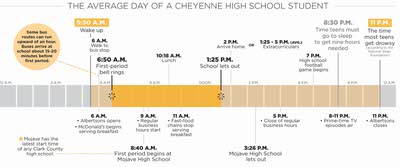
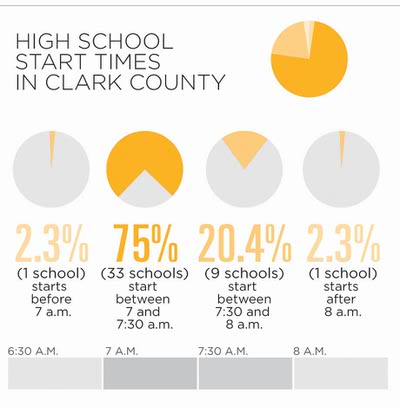
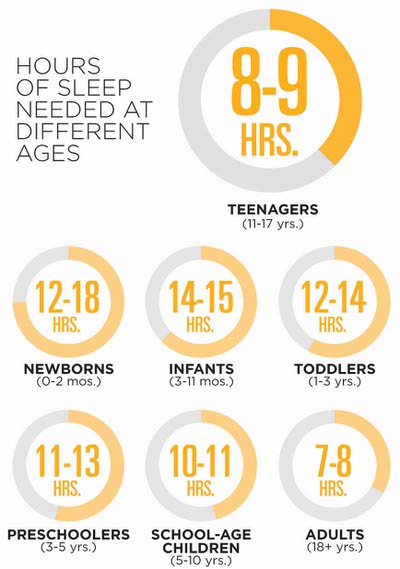
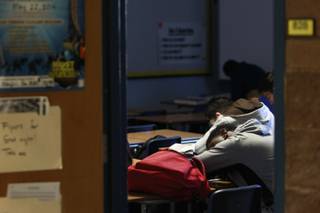

Join the Discussion:
Check this out for a full explanation of our conversion to the LiveFyre commenting system and instructions on how to sign up for an account.
Full comments policy